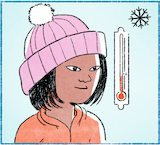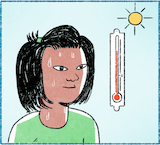

นี้เป็นอี่หยัง อันนี้เป็นลึดูหนาว เป็นลึดูหนาว
ในลึดูหนาวนี้สิเฮ็ดให้อากาดเย็น หลือมีความเย็นนั้นหละ
แล้วเป็นหญังพุหญิงคนนี้ เขาคือใส่หมวก เขากะอาดสิหนาว หลืออาดสิเย็น เขากะเลยใส่หมวก เพื่อที่สิให้มันลดอากานเย็น หลืออากานหนาว ให้มันอุ่นขึ้น หลือมีล้างกายอุ่นขึ้นนั้นหละ
17
นี้คืออี่หยัง เป็นหน้าฮ้อน หลืออากาดฮ้อนนั้นหละ
อยู่หน้าของเขาเป็นน้ำอี่หยัง เป็นเหงี่ย เหงี่ยอยู่หน้าเขาไหลออก เพาะว่าอากาดมันฮ้อน เหงี่ยอยู่หน้าเขากะเลยออก
แล้วเขาใส่หมวกบ่ตอนนี้ บ่ ตอนนี้เขาบ่ได้ใส่หมวก อากาดมันบ่ได้หนาว เขากะเลยบ่ใส่หมวก เพาะว่าอากาดมันฮ้อน
Link to overview page
Link to dictionary
| Isaan | Pronunciation | Tones | Thai | English/Notes |
|---|---|---|---|---|
| นี้ | ni: | HF | นี้ | 1. this 2. here |
| เป็น | pen | M | เป็น | 1. to be, to exist 2. to be able to 3. to suffer, sth. happens to 4. เป็นหญัง[...]คือ in initial position: why? {เป็นหญังเขากะคือแปงฟัน = Why is he brushing his teeth?} {เป็นหญังเคี่ยงบินมันคือสิตก = Why is the airplane falling down?} |
| อี่หยัง | i:-yaŋ | H-M | อะไร | 1. what {นี้คืออี่หยัง = What is this?} {มื้อนี้เจ้าเฮ็ดอี่หยัง = What are you doing today?} {กินเข้างายกับอี่หยัง = What did you have for breakfast?} 2. something, anything, (in negations) nothing {บ่ต้องเฮ็ดอี่หยังอีกเลยนอกจากใส่ปุย = [we] don't need to do anything besides adding fertilizer} |
| อัน | an | M | อัน | 1. thing, object 2. general clf. for objects |
| ลึดู | lʉ-du: | H-M | ฤดู | season |
| หนาว | na:o | M | หนาว | cold, chilly (personal sensation) |
| ใน | nai | HR | ใน | in, within |
| สิ | si | M | จะ | future tense auxiliary {เขากำลังสิตื่น = he's about to wake up} {สิไปตะหลาด = [I'm] going to the market} |
| เฮ็ด | het | H | ทำ | to do, to make |
| ให้ | hai | LF | ให้ | 1. to give {หมอกำลังเอายาให้คนป่วยกิน = the doctor is giving the patient medicine} 2. for 3. to allow, to be allowed |
| อากาด | a:-ga:t | M-LF | อากาศ | 1. weather, climate 2. air |
| เย็น | yen | M | เย็น | cold, cool (air, objects) |
| หลือ | lʉ: | M | หรือ | or |
| มี | mi: | HR | มี | 1. to have 2. there is |
| ความเย็น | khwa:m-yen | HR-M | ความเย็น | coldness, coolness |
| นั้นหละ | nan-la | HF-M | นั่นแหละ | auxiliary for emphasis at the end of a phrase |
| แล้ว | lɛ:o | HF | แล้ว | 1. finished 2. already 3. and then, and next (especially แล้วกะ) 4. auxiliary for past tense |
| หญัง | ɲaŋ | M | อะไร, เป็นหญัง = ทำไม | 1. what {เขากำลังเฮ็ดหญัง = What is he doing?} {ธูปเอาไว้เฮ็ดหญัง = What are incense sticks for?} 2. something, anything, (nothing) 3. เป็นหญัง[...]คือ in initial position: why {เป็นหญังเขาคือใส่บักพิกลงไปในกวยเตียว = Why is he putting chili in [his] noodle soup?} {เป็นหญังหน้าต่างมันคือเปิด = Why is the window open?} {เป็นหญังมันคือมีควนไฟ = Why is there smoke?} |
| พุหญิง | phu-ɲiŋ | H-M | ผู้หญิง | woman, female |
| คน | khon | HR | คน | person, people |
| เขา | khao | M | เขา | personal pronoun: he, she |
| คือ | khʉ: | HR | คือ | 1. to be, to resemble, like, as 2. why {บักหล้าคือบ่เก็บโต่ะแน่ = [addressing a young boy] Why haven't you cleared the table?} |
| ใส่ | sai | H | ใส่ | 1. to put something in/on {เขาใส่บักพิกในกวยเตียวหลาย = he's putting a lot of chili in his noodle soup} {เขาบีบยาสีฟันใส่แปงสีฟัน = he squeezes toothpaste on the toothbrush} {ก่องเอาไว้ใส่ของ = boxes are there to put stuff in} 2. to wear (clothes) {เขาใส่เสี้ยแขนญาว = he's wearing a long-sleeve} 3. directed at {เอิ้นใส่กัน = to call each other/to say to each other} {หมามันเห่าใส่แมว = the dog barks at the cat} {ล้องเพงใส่ไม = to sing into the microphone} {เขากำลังซี้มือไปใส่พุซาย = she's pointing at the man} |
| หมวก | mu:ak | LF | หมวก | hat |
| กะ | ga | M | ก็ | 1. then, consequently 2. also |
| อาด | a:t | LF | อาจ | 1. might, may, will 2. likely |
| เลย | lə:i | HR | เลย | 1. futher on, beyond, past {เข็มน้อยเลยเลขสิบสองไป = the minute hand has passed number twelve} 2. too much 3. at all 4. definitively 5. completely, utterly |
| เพื่อที่ | phʉ:a-thi: | H-H | เพื่อที่ | in order to, so that Notes: the vowel เอือ is likely to be a Thai loan |
| มัน | man | HR | มัน | it (also used to refer to people) |
| ลด | lot | H | ลด | to reduce, to lower, to decrease |
| อากาน | a:-ga:n | M-M | อาการ | state, condition, symptom |
| อุ่น | un | H | อุ่น | warm |
| ขึ้น | khʉn | LF | ขึ้น | 1. to go up, to increase 2. sun: to rise {ตะเว็นกำลังขึ้น = the sun is rising} 3. more 4. bus/train etc.: to get on, to board {พุโดยสานขึ้นลดไฟเบิดแล้ว = all passengers have boarded the train} |
| ล้างกาย | la:ŋ-ga:i | HF-M | ร่างกาย | body |
| หน้าฮ้อน | na:-hɔ:n | LF-HF | หน้าร้อน | summer, hot season |
| ฮ้อน | hɔ:n | HF | ร้อน | hot |
| อยู่ | yu: | H | อยู่ | 1. to be (located) at 2. yet, still 3. auxiliary indicating continuous or progressive action {ทอดปาอยู่ในกะทะ = (in the process of) frying a fish in the pan} {แม่กำลังเมี้ยนเฮียนอยู่ = mother is cleaning/tidying up the house} |
| หน้า | na: | LF | หน้า | 1. front {ปะตูหน้า = front door} 2. face {เขากำลังล้างหน้า = he's washing his face} 3. auxiliary: conditional tense {เขาหน้าสิเป็นพุบ่าวพุสาวกัน = they are probably groom and bride} {กะหน้าสิส้มอยู่ = it's likely to be sour} 4. season {หน้าฮ้อน = hot season} 5. page 6. clf. for pages {เฮาอ่านฮอดหน้านั้นแล้ว = we've read until this page} |
| ของ | khɔ:ŋ | M | ของ | of, belonging to |
| น้ำ | na:m | HF | น้ำ | 1. water 2. drink, soft drink, juice |
| เหงี่ย | ŋi:a | H | เหงื่อ | sweat |
| ไหล | lai | M | ไหล | to flow |
| ออก | ɔ:k | LF | ออก | 1. to go out, to leave 2. out |
| เพาะว่า | phɔ-wa: | H-H | เพราะว่า | because |
| บ่ | bɔ: | H | ไม่ | 1. no, not 2. question particle, transforming a statement into a question Notes: spelling exception in line with common usage on social media |
| ตอนนี้ | tɔ:n-ni: | M-HF | ตอนนี้ | now |
| ได้ | dai | HF | ได้ | 1. can 2. to get, to obtain 3. before verb: indicating past tense 4. บ่ได้ + verb: not |